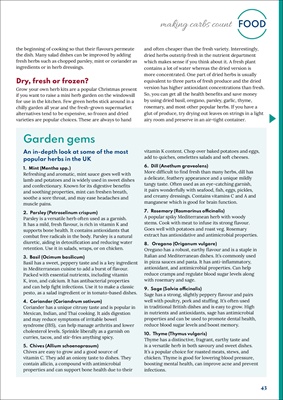
43
FOOD
making carbs count
the beginning of cooking so that their flavours permeate
the dish. Many salad dishes can be improved by adding
fresh herbs such as chopped parsley, mint or coriander as
ingredients or in herb dressings.
Dry, fresh or frozen?
Grow your own herb kits are a popular Christmas present
if you want to raise a mini herb garden on the windowsill
for use in the kitchen. Few green herbs stick around in a
chilly garden all year and the fresh-grown supermarket
alternatives tend to be expensive, so frozen and dried
varieties are popular choices. These are always to hand
and often cheaper than the fresh variety. Interestingly,
dried herbs outstrip fresh in the nutrient department
which makes sense if you think about it. A fresh plant
contains a lot of water whereas the dried version is
more concentrated. One part of dried herbs is usually
equivalent to three parts of fresh produce and the dried
version has higher antioxidant concentrations than fresh.
So, you can get all the health benefits and save money
by using dried basil, oregano, parsley, garlic, thyme,
rosemary, and most other popular herbs. If you have a
glut of produce, try drying out leaves on strings in a light
airy room and preserve in an air-tight container.
Garden gems
An in-depth look at some of the most
popular herbs in the UK
1. Mint (Mentha spp.)
Refreshing and aromatic, mint sauce goes well with
lamb and potatoes and is widely used in sweet dishes
and confectionary. Known for its digestive benefits
and soothing properties, mint can freshen breath,
soothe a sore throat, and may ease headaches
and muscle pains. A staple in teas, desserts, and
savoury dishes.
2. Parsley (Petroselinum crispum)
Parsley is a versatile herb often used as a garnish.
It has a mild, fresh flavour, is rich in vitamin K and
supports bone health. It contains antioxidants that
combat free radicals in the body. Parsley is a natural
diuretic, aiding in detoxification and reducing water
retention. Use it in salads, wraps, or sprinkled
on chicken.
3. Basil (Ocimum basilicum)
Basil has a sweet, peppery taste and is a key ingredient
in Mediterranean cuisine to add a burst of flavour.
Packed with essential nutrients, including vitamin
K, iron, and calcium. It has antibacterial properties
and can help fight infections. Use it to make a classic
pesto, as a salad ingredient or in tomato-based dishes.
4. Coriander (Coriandrum sativum)
Coriander has a unique citrusy taste and is popular in
Mexican, Indian, and Thai cooking. It aids digestion
and may reduce symptoms of irritable bowel
syndrome (IBS), can help manage arthritis and lower
cholesterol levels. Sprinkle liberally as a garnish on
curries, tacos, and stir-fries. Goes well with anything
spicy, including rice.
5. Chives (Allium schoenoprasum)
Chives are easy to grow and a good source of
vitamin C. They add an oniony taste to dishes. They
contain allicin, a compound with antimicrobial
properties and can support bone health due to their
vitamin K content. Chop over baked potatoes and eggs,
add to quiches, omelettes salads and soft cheeses.
6. Dill (Anethum graveolens)
More difficult to find fresh than many herbs, dill has
a delicate, feathery appearance and a unique mildly
tangy taste. Often used as an eye-catching garnish,
it pairs wonderfully with seafood, fish, eggs, pickles,
and creamy dressings. Contains vitamins C and A and
manganese which is good for brain function.
7. Rosemary (Rosmarinus officinalis)
A popular spiky Mediterranean herb which grows on
woody stems. Cook with meat to infuse its strong
flavour. Goes well with potatoes and roast veg.
Rosemary extract has antioxidative and antimicrobial
properties.
8. Oregano (Origanum vulgare)
Oregano has a robust, earthy flavour and is a staple in
Italian and Mediterranean dishes. It's commonly used
in pizza sauces and pasta. It has anti-inflammatory,
antioxidant, and antimicrobial properties. Can help
reduce cramps and regulate blood sugar levels along
with rosemary and sage.
9. Sage (Salvia officinalis)
Sage has a strong, slightly peppery flavour and pairs
well with poultry, pork and stuffing. It's often used
in traditional British dishes and is easy to grow. High
in nutrients and antioxidants, sage has antimicrobial
properties and can be used to promote dental health,
reduce blood sugar levels and boost memory.
10. Thyme (Thymus vulgaris)
Thyme has a distinctive, fragrant, earthy taste and is a
versatile herb in both savoury and sweet dishes. It's a